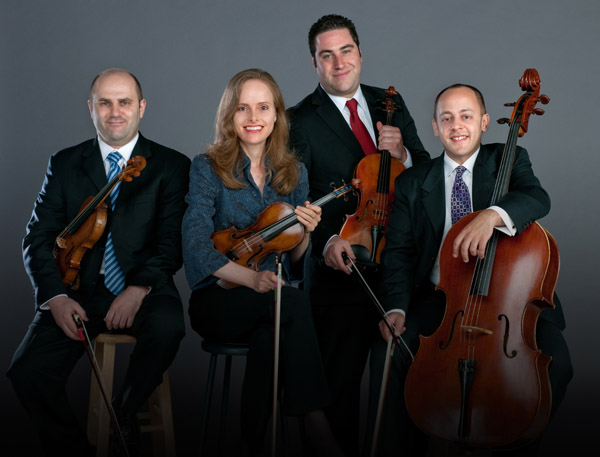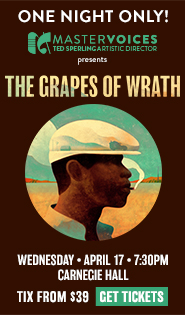Amernet Quartet brings rich Old World flavor to New York return

The Amernet String Quartet performed music of Mozart, Janacek, Briggs and Beethoven Saturday night at Bargemusic.
The Amernet String Quartet is making a welcome return to the big city this weekend. The first stop for these New York ex-pats from Juilliard—now ensemble in residence at Florida International University in Miami—was at Bargemusic Saturday night, where they brought a fulfilling program of repertoire classics and new music. But the most important thing they brought was their sound.
There’s a cliché about how string quartets are about conversation, but the aesthetic of tonal unanimity implies an equal unanimity of opinion. Dialogue become dogma, a lecture among a group of yes-men.There’s a proliferation of individually impressive quartets that, as a whole conform, to a bright, homogenized sound that makes for a consensus style.
The Amernet Quartet is different, and their sound is complex. There is an Old World flavor, like that of the Talich or Végh quartets, and, instead of an emulsification, the group conveys four eloquent individuals playing together in sympathy. They are idiosyncratic (a quality in desperately short supply in the classical music business), and their playing has an ethical force, as if expressing the fundamentals of the form through their very sound.
Leading them in this style is first violinist Misha Vitenson, whose timbre is warm rather than bright, with vinegar, seeming to come from a place where the light is a permanent dusk. Violinist Marcia Littley, violist Michael Klotz, and cellist Jason Calloway all share a tendency towards both warmth and darker hues.
Everything they played Saturday night was a pleasure to hear: Mozart’s String Quartet No. 8, K. 168, the second quartet by Janacek, “Intimate Letters,” the local premiere of String Quartet No. 3 from composer Jeffrey Briggs and Beethoven’s final Quartet No. 16, Op. 135. Brigg’s piece rewarded close listening, while the other performances were a reminder of how savory the music is after years of pablum.
The Mozart playing was lovely, with a salon-type intimacy with the music and with each other. The verve of the ornamentation and rhythms would have pleased any cultured aristocrat. Within a skillful but standard exploration of the classical style, the second Andante movement is mature Mozart, full of human feeling and with a startling and sublime sequence of chromatic harmonies.
Janacek’s fantastic String Quartet No. 2 was a meeting of minds going against the grain. Janacek’s fascinating style, a musical language that is both recognizably classical yet seems to be entirely self-invented, sounded superb under the hands of the musicians. They understood the composer’s willfulness, the yearning, the weird bursts of inexplicable noise, the intense passion.
Klotz’s quasi-vocalized viola stood out in the ensemble, but this was an excellent group performance. The Amernet emphasized every abrupt halt to a phrase, every juxtaposition of seemingly incompatible ideas, the strange mournfulness of the third movement. They articulated Janacek with great skill and feeling, and entirely on the composer’s own terms.
Brigg’s three-movement piece is attractive and subtly ambitious. It opened with set of hushed, rocking sonorities, swaying in counterpoint to the barge itself in the East River currents. There is a short violin line that reaches gracefully for the sky. The composing has the intriguing quality of being built out of tiny units that are parts of different eras in the string quartet literature, like two-beat classical rhythms, and groups of four sixteenth notes. The music doesn’t develop so much as explore its own antecedents.
The short second movement is a Stephen Foster-esque country blues, the finale an intricate machine of offset, rhythmic, interlocking parts. The medium tempo was ideal, making it easy to hear how each bit of the machine worked together to build a substantial, weighty whole.
For the Beethoven, once again, the sheer sound of the group was marvelous. The final quartet is charming, witty, relatively short and yet deep. Beethoven’s late style gives the feeling of the composer talking to himself, with different lines conversing and arguing, here presenting a public face, there turning inward, lost in memories and reveries.
The individuality of the four musicians brought illumination and emphasis to these ideas. They played the Lento assai with the kind of proud dignity that is an essential part of Beethoven, and while some of the rhythms in the Vivace were less than completely sharp, the quartet played the explosive dotted rhythms of the fanfare-like tune with the spring that unlocks Beethoven’s bottomless well of energy.
The Amernet Quartet play music by Steven Gerber 7:30 p.m. Monday at Le Poisson Rouge


